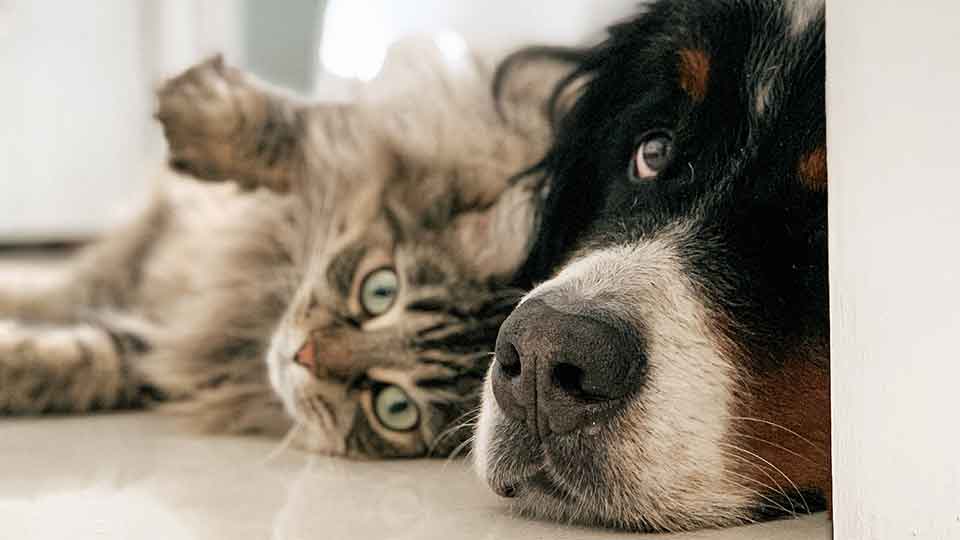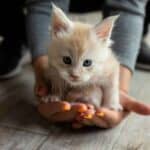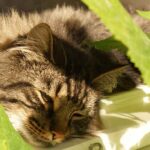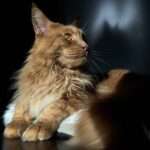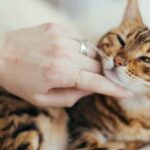When someone asks me about Maine Coon cats and dogs living together, it often reminds me of Tom and Jerry, where the cat, the mouse, and the dogs being together are often at war.
It’s an important question for multi-pet households.
The truth is, in my experience, Maine Coons and dogs can absolutely develop close bonds and live harmoniously together with proper introductions and training.
Maine Coons are known for their sociable, friendly, and easygoing nature, which makes them one of the best cat breeds for families with dogs.
They’re often referred to as the “dogs of the cat world” because of their playful and affectionate personalities, and their size also makes them less likely to be intimidated by dogs.
Can Maine Coon Get Along with Dogs?
Now, don’t get me wrong.
I’m not saying that you can just throw them together and expect instant harmony.
Like any two creatures, they need a proper introduction and some time to adjust.
But the good news is, Maine Coons are generally more adaptable and patient, which increases the chances of a successful interspecies friendship.
My Maine Coon, Bella, is a perfect example. Bella was understandably cautious when we first brought our Golden Retriever puppy, Max, home.
But with slow introductions and lots of positive reinforcement, they soon became fast friends.
Now, they’re inseparable, whether playing chase around the house, or napping together in the sun.
Which Dogs Get Along With Maine Coons?
While Maine Coons are typically sociable, the success of their relationship with a dog often depends more on the dog’s temperament and breed.
The ideal dog companion for a Maine Coon is not overly aggressive or too high-energy and has been socialized to live peacefully with other animals.
Breeds known for their gentle and tolerant nature, like Golden Retrievers, Labrador Retrievers, Beagles, or Bulldogs, often make great companions for Maine Coons.
These dogs are generally friendly and patient, which matches the Maine Coon’s playful and easygoing personality.
They are also less likely to chase or play too rough, which could scare or upset the cat.
On the other hand, breeds with a high prey drive or strong territorial instincts might pose more of a challenge.
However, it’s important to remember that every dog is an individual, and breed alone doesn’t determine behavior.
I’ve seen energetic breeds like Border Collies and even hunting breeds like Beagles form strong bonds with their feline housemates.
Training and socialization are crucial in any case.
The dog should know basic commands like “leave it” and “stay”, and should be taught to respect the cat’s space.
And remember, always supervise their interactions until you’re sure they can get along safely.
In my situation, Max’s friendly and laid-back nature made him a perfect match for Bella.
But their successful friendship is also a testament to the time we invested in careful introductions, training, and supervision.
Today, their bond is a joy to behold: they interact with mutual respect, share spaces comfortably, and even engage in gentle play.
So, can Maine Coons and dogs live together?
Absolutely!
With patience, understanding, and some planning, these seemingly different creatures can form a bond that’s nothing short of magical.
If you’re considering bringing a Maine Coon into a home with a dog, or vice versa, I hope my experience and tips help you create a peaceful and happy multi-species household.
Remember, every pet is unique. So it may not work for everyone. But with love and patience, I truly believe that Maine Coons and dogs can become the best of friends.
What Are The Challenges of A Maine Coon and A Dog Living Together?
While Maine Coons and dogs can form beautiful bonds, there can be challenges along the way.
It’s important to remember that these are two species, each with its unique behaviors, communication styles, and needs.
One challenge can be the difference in play styles.
Dogs are often more physical and may play rough, while cats, including Maine Coon, prefer more subtle, less aggressive play.
Bella loves a good game of chase with Max, but there are times when Max gets a bit too energetic, and Bella has to retreat to his high perch.
Another challenge is the communication mismatch.
Dogs and cats have different body languages.
A dog wagging its tail signifies happiness, but for a cat, it’s usually a sign of agitation.
Helping them understand each other’s signals takes patience and close supervision.
Also, remember that Maine Coons, despite their friendly nature, still need a quiet place to retreat to.
Dogs, especially energetic ones, can sometimes overwhelm them.
Ensuring your Maine Coon has access to dog-free zones(for example, a cat tree) where they can relax is essential.
Lastly, resource sharing can be a challenge.
Dogs might try to eat the cat’s food or use the cat’s litter box, both of which can cause stress for the cat.
Setting clear boundaries and having separate resources can help avoid these issues.
How to Introduce A Maine Coon To A Dog?
Introducing a Maine Coon to a dog requires patience, planning, and a gradual approach.
Here’s a step-by-step guide based on my experience:
1. Keep Them Separated At First
Start by keeping them in separate rooms. This allows them to get used to each other’s scent and presence without direct contact.
2. Swap Scents
Exchange bedding between the two to help them get accustomed to each other’s scent.
This familiarization is a crucial part of the process.
3. Controlled Introductions
Have the dog on a leash for the first few face-to-face meetings and let the cat set the pace.
Keep these meetings short and positive.
4. Observe Their Behavior
Watch their body language closely.
Look for signs of stress or aggression. If you see any, separate them and slow down the process.
5. Positive Reinforcement
Reward both pets with treats and praise for calm, non-aggressive behavior during these meetings.
This helps them associate each other’s presence with positive experiences.
6. Gradual Increase In Interaction
Gradually increase the time they spend together under supervision. Continue with positive reinforcement.
7. Never Force Interaction
Don’t push them to interact more than they’re comfortable with. Let the relationship develop at its own pace.
8. Ensure Separate Resources
Ensure each pet has food, water, dishes, beds, and toys. For your Maine Coon, place the litter box somewhere the dog can’t access.
Remember, the goal is for both pets to feel safe and comfortable. It may take time, but with patience, most Maine Coons and dogs can learn to live together peacefully.
How to Improve Maine Coon and Dogs’ Relations?
Improving relations between a Maine Coon and a dog involves fostering mutual respect and understanding while ensuring each pet’s needs are met.
Here are some strategies you can apply:
1. Understand their Communication Styles
Cats and dogs have different ways of communicating.
For example, a wagging tail means different things for each species.
Take time to learn about their distinct communication styles. This knowledge will allow you to interpret their interactions better and intervene if necessary.
2. Encourage Positive Interactions
Reward both the Maine Coon and the dog for positive, peaceful interactions.
This could be as simple as them being in the same room without any signs of stress or aggression.
Use treats, praise, or petting to reinforce these positive behaviors.
3. Provide Adequate Personal Space
Ensure that your Maine Coon has a safe, dog-free zone they can retreat to.
This could be a room with a baby gate, or a tall cat tree or shelves the dog can’t access.
Having a secure retreat can reduce stress for the cat.
4. Maintain a Routine
Pets thrive on routine.
Consistent feeding, play, and sleep times can help reduce stress and conflict.
If your pets know what to expect and when to expect it, they’re less likely to feel anxious or territorial.
5. Engage in Joint Activities
Engage your Maine Coon and your dog in activities they can enjoy together, like interactive play with toys that are safe for the two of them.
Supervised play sessions can build positive associations and deepen their bond.
6. Gradual Exposure
If your pets are still getting used to each other, continue with gradual exposure.
Keep their interactions short, positive, and controlled.
Over time, you can increase the duration and decrease the level of control, always watching for signs of stress or discomfort.
7. Consult a Professional
If conflicts persist or if either pet shows signs of chronic stress, it may be beneficial to consult with a professional.
A pet behaviorist or a vet with experience in multi-species households can provide valuable insights and guidance.
Building a harmonious relationship between a Maine Coon and a dog is a process, and it requires time, patience, and understanding.
But the rewards – seeing them interact peacefully and even form a bond – are well worth the effort!
There’s nothing better than seeing your two furry companions curled up together on the couch or playing joyfully. With the right match and introductions, Maine Coons and dogs create a harmonious multi-pet home.
FAQ
Are Maine Coons Good Pets?
Absolutely! Maine Coons make lovely pets for many reasons.
Here are some of the qualities that make them such beloved companions:
Friendly and Affectionate
Maine Coons are known for their friendly and affectionate nature. They form strong bonds with their human families and often get along well with other pets, including dogs. They’re often called as the “gentle giants” of the cat world.
Intelligent and Playful
Maine Coons are highly intelligent and curious. They love interactive toys and games that challenge their mind. This playful and intelligent nature can make them much fun around the house.
Good with Children
Their gentle and patient nature often makes Maine Coons great pets for families with children. They’re generally tolerant of children’s play, and their size makes them less likely to be injured by younger kids.
Adaptability
Maine Coons are known for their adaptability. They can adjust to various living environments, from busy families to quieter, single-person households.
Gorgeous and Unique
Let’s not forget their striking appearance! Maine Coons are one of the largest domesticated cat breeds. They have beautiful, thick coats, tufted ears, and bushy tails. Their majestic looks, combined with their sweet personalities, often make them the center of attention.
However, it’s important to remember that Maine Coons, like all pets, come with responsibilities. They need regular grooming due to their long fur, a balanced diet, plenty of play and exercise, regular vet check-ups, and lots of love and attention.
But if you’re ready for the commitment, a Maine Coon can make a fantastic, loving companion.
Their friendly, playful, and affectionate nature can bring a lot of joy and warmth to a home.
Do Maine Coons Like To Be Held?
The preference for being held can vary significantly from one Maine Coon to another, mainly depending on the individual cat’s personality and past experiences.
Some Maine Coons may enjoy being held and cuddled, while others may prefer to keep their feet on the ground.
Here are a few general points to consider:
Temperament
Maine Coons are generally known for their friendly and affectionate nature. They often enjoy spending time with their human family members and may appreciate being held if it’s done gently and respectfully.
Early Socialization
Cats that were regularly and gently handled as kittens are more likely to enjoy being held as adults. If your Maine Coon was socialized to enjoy human touch from a young age, they might be more comfortable with being held.
Respect Their Boundaries
It’s important to pay attention to your Maine Coon’s body language and respect their boundaries. If your cat shows signs of discomfort (like squirming, tail flicking, or trying to escape), it’s best to put them down and try again another time.
Size Consideration
Keep in mind that Maine Coons are one of the largest domestic cat breeds, with adult males often weighing 13-18 pounds and females typically weighing 8-12 pounds. Their size can make holding them more challenging, especially for extended periods.
Proper Holding Technique
When holding any cat, including a Maine Coon, it’s essential to use a proper holding technique.
Support their back and hindquarters at all times, and never lift them by the scruff or front limbs.
Respecting your pet’s preferences is important to build trust and maintain a positive relationship.
Always approach your Maine Coon calmly and gently, and pay close attention to their body language when holding them.
Can a Maine Coon Kill a Dog?
Maine Coons are one of the largest breeds of domestic cats, but it’s doubtful for a Maine Coon to kill a dog.
While they have sharp claws and teeth, they are generally not naturally aggressive, especially towards larger animals like dogs.
If threatened, a Maine Coon is more likely to run away or hide rather than engage in a fight.
That said, a cat can inflict serious harm on a dog, particularly if the dog is small and the cat feels threatened.
Cats have sharp claws that can cause painful scratches, and their bites can potentially transmit bacteria, leading to infection if not treated promptly.
However, it’s more common for dogs to pose a risk to cats, especially if the dog is a large breed or has a high prey drive.
This is why it’s important to supervise interactions between dogs and cats, especially when they’re first getting to know each other, and to train both animals to interact peacefully.
In any household with cats and dogs, it’s essential to ensure each pet has space to retreat to feel safe.
If any signs of aggression are observed, it’s important to consult with a professional trainer or a veterinarian to address the issue safely and effectively.
Related: How to Find TICA Registered Maine Coon Breeders Near Me? (2023 Updated)

